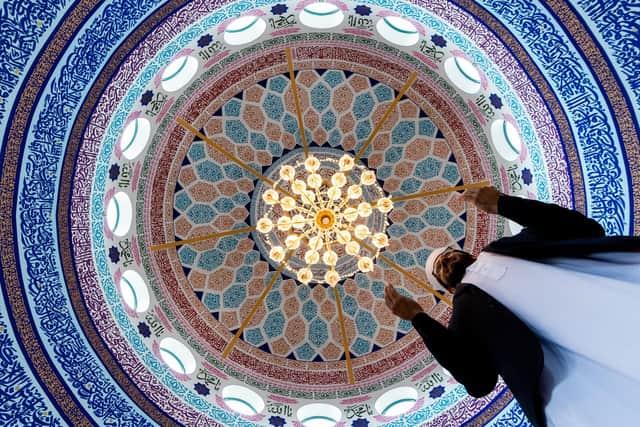Divisive rhetoric has meant mosques having to ramp up security for nightly Ramadan prayers - Qari Asim
The concept of fasting is practised to varying degrees and with differing objectives in many religions across the world. Christians currently observing Lent, for example, will have given up eating something they otherwise enjoy for 40 days. For Muslims, God tells us in the Holy Quran that the objective of fasting is so “that you may develop God-consciousness." (Quran 2:183).
Ramadan is the most eagerly anticipated time of the year for Muslims. Rather than dreading the physical hardships the month inevitably brings, the majority of Muslims rejoice in the benefits to individual spirituality and the renewed connections with community through communal prayers in mosques and gatherings with family and friends to break the fast.
Advertisement
Hide AdAdvertisement
Hide AdThere is a visceral connection between having an empty stomach and being grateful for what one has. By starving the body, we are feeding the soul and providing it with an opportunity to reconnect with its Creator, and many Muslims will use Ramadan as an opportunity to shift the focus away from material goals, renew their personal relationship with God, detox their bodies and enhance mental resilience.


Ramadan is a time for increased self-reflection, prayer and contemplation as well as a time for community and joy, but the deadly situation in Gaza weighs heavily on our minds this year. Many of my congregants have expressed deep pain and trauma over the loss of all lives since October 7 and which they are continuing to witness, on a daily basis, on electronic and social media. The fears of impending attacks in Rafah compounds their sense of helplessness, anxiety and pain.
Each Ramadan engenders empathy towards those whose lives are blighted by hunger and suffering, but for many this year their own fleeting hunger pangs are a regular reminder of the starving adults, and children they're seeing on their screens in Gaza. As we will be opening our fasts with family and friends, we will be thinking of the millions of adults and children in Gaza, Sudan, Yemen and across the world who are currently without access to food and water, and praying for their suffering to be alleviated.
Ramadan is also the month in which Muslims believe the words of God in the Quran were first revealed. Muslims try to expend more effort on connecting with the Quran and taking part in lengthy congregational night prayers in bustling mosques, where the whole of the Quran is completed. With a three-fold increase in Islamophobia in recent months, there is deep fear amongst many Muslims attending nightly prayers, in particular women who often bear the brunt of anti-Muslim prejudice given that they are easily identifiable as Muslims.
Advertisement
Hide AdAdvertisement
Hide AdThe divisive and toxic rhetoric espoused by some politicians in recent weeks has meant that many mosques have had to increase security this Ramadan. It is utterly reprehensible that some people in our country are continuing to conflate criminality and violent extremism with ordinary Muslims, and to fan the flames of anti-Muslim hatred.
Given the impact fasting has on daily life for Muslims, non-Muslim friends, colleagues and neighbours showing a willingness to learn and understand more about Ramadan is generally very welcome and demystifies some assumptions about the faith. This year, many work-places will be taking part in fasting initiatives which will see non-Muslims fasting alongside their Muslim colleagues, in an act designed to promote understanding and show solidarity. It is also encouraging that interfaith Iftar (breaking of the fast) events are continuing to take place and people of all faiths and beliefs are coming together to find hope and healing in these extremely tense and sensitive times. Unless we hear each other and find a common language to express our pain and care for all human beings, tribalism, division, and extremism will prevail in our circles.
Ramadan promotes extra generosity, respect and giving preference to those less fortunate than ourselves – whether they are the homeless, poor and refugees in our hometowns or abroad. Young Muslim volunteers from my mosque and other Muslim charities will distribute thousands of meals to the vulnerable in Leeds over the month of Ramadan. The other week, I was in Tanzania and Kenya distributing food and essential items purchased with charitable donations collected in Leeds to some of the most needy people there. During Ramadan, our Leeds-based charity, Peace Matters, is focusing on fundraising to provide medical care in Gaza, food packs in East Africa and educational facilities in many of the refugee camps. The charity and generosity shown in this month strengthens the human bond and the message that there is enough in the world for everyone’s needs, if people are willing to redistribute their wealth to those who need it.
Imam Qari Asim is Imam at Makkah Mosque Leeds and trustee of Peace Matters charity.
Comment Guidelines
National World encourages reader discussion on our stories. User feedback, insights and back-and-forth exchanges add a rich layer of context to reporting. Please review our Community Guidelines before commenting.